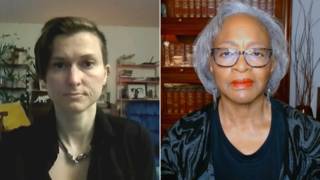
While being booked for attempting to overturn the 2020 presidential election, Donald Trump made history as the first former president to have his mugshot taken and released to the public. Shortly after the image of Trump scowling at a police camera started to circulate, the embattled real estate mogul and politician began using it to raise money for his 2024 presidential campaign. “Mugshots have these various ways of being deployed … to craft a narrative, or to reinforce a narrative,” says Emory University professor Carol Anderson, who contrasts the novelty of Trump’s mugshot with the usage of mugshots by the media and the state to convey an image of Black criminality. As L.A. Times reporter Keri Blakinger explains, “the widespread distribution of mugshots undermines the presumption of innocence” and exacerbates racial bias. Blakinger is also the author of the memoir Corrections in Ink, which details her experience serving time in prison in upstate New York. “If he were treated like any other defendant, [Trump] would have been given a bail amount he couldn’t afford and left to die in a filthy cell,” she notes, cautioning that “the more that we celebrate some of these broken features of the system, the more ingrained they become.”
This content originally appeared on Democracy Now! and was authored by Democracy Now!.
Democracy Now! | Radio Free (2023-08-25T12:33:59+00:00) Are “Mugshots” Unethical? How Jailhouse Photos Undermine Defendants & Reinforce Systemic Bias. Retrieved from https://www.radiofree.org/2023/08/25/are-mugshots-unethical-how-jailhouse-photos-undermine-defendants-reinforce-systemic-bias/
Please log in to upload a file.
There are no updates yet.
Click the Upload button above to add an update.